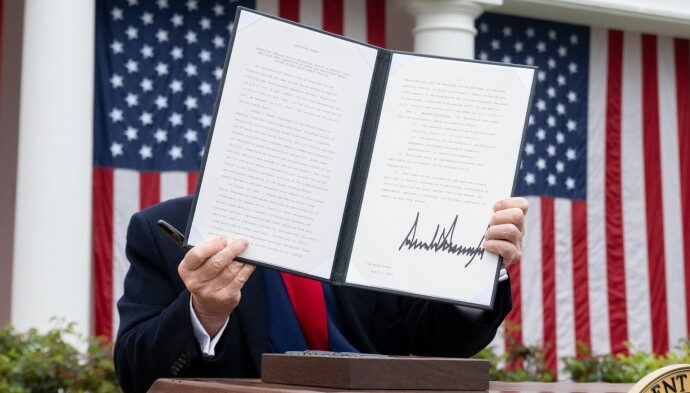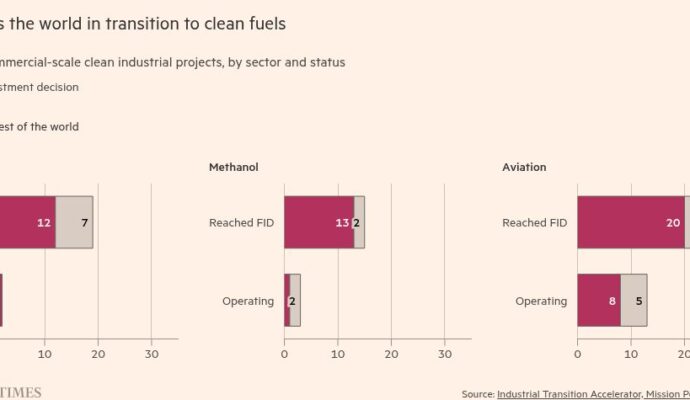Unlock the Editor’s Digest for free
Roula Khalaf, Editor of the FT, selects her favourite stories in this weekly newsletter.
The UK, Australia and Canada have formally recognised the state of Palestine, in a co-ordinated move amid mounting international outrage over the humanitarian catastrophe caused by Israel’s offensive in Gaza.
The landmark announcement by three of Israel’s traditional allies comes as Israel intensifies its campaign against Hamas in Gaza, which has tipped part of the strip into famine, and drawn accusations — which Israel denies — that it is committing genocide in the Palestinian enclave.
The decisions — fiercely opposed by Israel and the US — will see the three Commonwealth countries join France and several others in formally recognising a Palestinian state at the UN General Assembly this week, in the most significant wave of recognitions for more than a decade.
While symbolic, the co-ordinated steps are a strong show of support for the Palestinians and a sharp rebuke to the far-right government of Israeli Prime Minister Benjamin Netanyahu, who insisted earlier this month that he would never allow the creation of a Palestinian state.
UK Prime Minister Sir Keir Starmer set out his recognition plan — which has deep historic resonance given the UK’s role in the creation of Israel after the second world war — in July after French President Emmanuel Macron said he would make the move.
Starmer was under huge pressure from his Labour MPs to follow suit as Israel intensified its 23-month offensive in Gaza, which has killed more than 65,000 people, according to Palestinian officials, and accelerated the expansion of Jewish settlements in the occupied West Bank.
In a televised statement, Starmer said: “Today, to revive the hope of peace for the Palestinians and Israelis, and a two-state solution, the UK formally recognises the state of Palestine.”
The Palestinian foreign minister, Varsen Aghabekian Shahin, welcomed the moves, saying they brought Palestinians “closer to sovereignty and independence”. “It might not end the war tomorrow, but it’s a move forward, which we need to build on and amplify,” she said.
Israel’s foreign ministry branded recognition as “nothing but a reward for jihadist Hamas”, whose October 7 2023 attack on Israel — during which militants killed 1,200 people and took 250 hostage, according to Israeli officials — triggered the current war.
“Israel will not accept any detached and imaginary text that attempts to force it to accept indefensible borders,” the ministry wrote on X.
Netanyahu also hit out at the announcements, reiterating that there would be “no Palestinian state”, and adding that he would deliver Israel’s response when he returned from New York.
Starmer denied that the move was “a reward for Hamas” and said the proscribed group could play no part in a two-state solution. He said he had instructed officials to draw up more sanctions on the group.
Macron took a similar line earlier this week, telling the CBS news channel that “the objective of Hamas is absolutely not to create a Palestinian state. The objective of Hamas is to destroy Israel, and to convince the maximum number of people that they have no chance at achieving peace and stability in a Palestinian state.”
Canada’s Prime Minister Mark Carney said that with the prospect of a two-state solution “steadily and gravely eroded” by both Hamas and the Israeli government’s actions, his country now recognised Palestinian statehood.
“While Canada is under no illusions that this recognition is a panacea, this recognition is firmly aligned with the principles of self-determination and fundamental human rights reflected in the UN charter,” he said.
Australia’s Prime Minister Anthony Albanese said his country’s recognition of Palestinian statehood was “part of a co-ordinated international effort to build new momentum for a two-state solution”.
The flurry of recognitions highlights Israel’s growing isolation over its offensive in Gaza, which has prompted international calls for boycotts against its companies, artists, academics and sportspeople.
But despite the international pressure, there is little sign that Netanyahu’s far-right government — which retains the staunch backing of US President Donald Trump — is close to ending its offensive, having recently launched a fresh military assault on Gaza City.
It has also accelerated plans to expand Jewish settlements in the West Bank, which are illegal under international law, including approving a controversial block of about 3,000 houses near Jerusalem.
Known as the E1 Plan, the project has long been regarded as a death knell for hopes of a contiguous Palestinian state as it would in effect split the West Bank in two, and sever East Jerusalem, which Palestinians seek as the capital of a future state, from the rest of the territory.
About 150 UN members already recognise a Palestinian state. France, Canada and the UK are the first G7 states to do so. About 165 countries recognise Israel.
Portugal was also due to recognise the state of Palestine at the UN later on Sunday, according to the Portuguese foreign ministry. Belgium and a handful of smaller states are also expected to follow suit.
Additional reporting by Barney Jopson in Madrid and Adrienne Klasa in Paris


